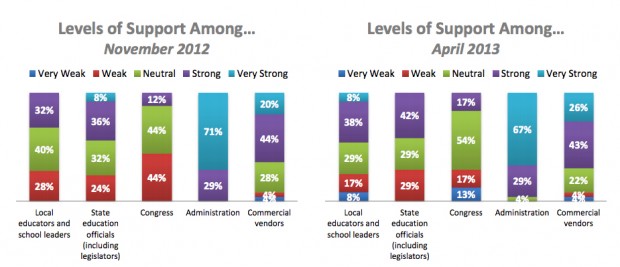Core Question: Who Supports The Common Core?

Mizanthrop / Flickr
What questions do you have about the Common Core, the nationally-crafted academic standards adopted by Indiana and 44 other states.
StateImpact is answering reader-submitted questions about the Common Core, a new set of expectations for what students should know and be able to do in math and English at each grade level. Indiana is one of 45 states that have fully adopted the Common Core.
Today, we’re answering a question we received from an audience member at the Common Core panel we hosted earlier this month:
Please explain the dynamics of the current battle in the statehouse over Common Core. What groups are opposed and why?
Indiana signed onto the Common Core in 2010 and is on track to fully implement the new academic standards by the 2014-15 school year. But in schools where teachers are already using the standards, some parents say Common Core homework looks radically different. That’s led to pushback against the new standards.
With such an active discussion over the standards’ future playing out at the statehouse, let’s take a step back and map out who stands for what in the debate over the Common Core.
Who Supports The Common Core?
We know the question is about who opposes the new standards, but let’s start at the beginning, with those who support them.
State-level education officials have been setting academic standards for more than two decades. But in 2008, the National Governors Association and the Council of Chief State School Officers began an initiative to write new, common standards for English language arts and math.“There had been a pretty strong pushback over the years against the idea of having federally-developed national standards,” says Derek Redelman, vice president of Education and Workforce Development for the Indiana Chamber of Commerce, one of the organizations that has advocated for the standards. “So, part of the thought was let’s get together and do them as a state project.”
Generally, people who support the Common Core do so for three reasons:
- They want stronger standards for states that didn’t have them before.
- They want nationally comparable data that explains not just how students in Indiana are doing compared to, say, neighboring Ohio, but how the United States compares to other countries. Comparing data across state lines, they argue, requires uniform academic standards.
- They want standards that prepare students for college and careers, something Redelman says wasn’t happening under the old Indiana standards.
Under the leadership of then-superintendent Tony Bennett and former Republican Gov. Mitch Daniels, the State Board of Education voted unanimously to approve the new standards in August 2010. (As opposition to the Common Core has mounted, State Board members have reiterated their support for the standards several times since then, including at their February 2013 meeting.)
The Indiana affiliates of national advocacy groups, such as Stand for Children and Students First, have been among the staunchest supporters of internationally-benchmarked standards. They’ve also organized resistance to the statehouse push to withdraw Indiana from the Common Core, urging teachers to testify in favor of the standards.
Businesses have also expressed support for the Common Core. In February, about 70 companies — including Indiana-based Eli Lily and Indiana University Health — ran a full-page ad in The New York Times advocating for standards that create “a more highly skilled workforce.”
Who Opposes The Common Core?
Bill Evers, a research fellow at Stanford University’s Hoover Institute, has been fighting the new math standards, which he says are inferior to what Indiana, California and many states have now. But he says rewriting the Common Core would only silence one type of critics — academics who argue the standards won’t ensure college and career ready graduates.

Elle Moxley / StateImpact Indiana
Opponents of the Common Core, a set of nationally-crafted academic standards, rallied at the statehouse before a January Senate Education Committee hearing.
There are at least two other groups that oppose the Common Core, says Evers:
So there is a left or liberal kind of criticism, that doesn’t like any standards or any testing. It just says the teachers are professional, let them have autonomy, let them close the door and we’re not going to test to see if they’re learning the material, we’re not going to give them a list of topics to go through, we’re going to leave that to their professional discretion.
Another set of people that would be unhappy — which I would also belong to — is the people who don’t like the nationalization of things, whether done by the federal government or done by a cartel of states.
In Indiana, the most vocal critics of the new standards are Indianapolis parents Erin Tuttle and Heather Crossin, leaders of a group called Hoosiers Against the Common Core. It’s affiliated with the national Truth in American Education movement.
Tuttle and Crossin’s opposition to the Common Core falls along two fault lines: They argue Indiana should keep its old standards, which were excellent, but also oppose the idea of nationally-crafted standards.
They took their concerns to state Sen. Scott Schneider, R-Indianapolis, who drafted legislation to withdraw Indiana from the Common Core. That proposal shifted into a plan to pause implementation until the Indiana Department of Education could hold a series of statewide meetings allowing the public to weigh in on the new standards — a plan that won the support of all but one Republican when it came to a vote on the Senate floor.
Indiana House Education Committee Chair Bob Behning, R-Indianapolis, blocked Schneider’s bill from a hearing on his panel. So Schneider attached anti-Common Core language to a separate education proposal. If it passes, it would halt implementation of the new standards pending legislative review.
“It’s about Indiana keeping control of what the students are learning and how we are going to test them,” Tuttle says.
How Has Support For the Common Core Changed?

Whiteboard Advisors
How perceived support for the Common Core State Standards shifted between Nov. 2012 and April 2013.
It hasn’t, not significantly — at least that’s the latest from a survey of education insiders published by Whiteboard Advisors.
- Forty-six percent of those surveyed rated the support of local educators and school leaders as “strong” or “very strong” in April 2013, compared to 32 percent six months ago.
- The percent of those surveyed who rated the support of state education officials and legislators as weak increased from 24 to 29 percent.
- Only about 30 percent felt Congressional support was “weak” or “very weak” compared to 44 percent six months ago.
But the bipartisan support the Common Core once enjoyed is fading, reports Anthony Cody for Education Week. The Republican National Committee denounced the new standards as “an inappropriate overreach to standardize and control the education of our children” in a resolution adopted this week. But party leaders such as Jeb Bush continue to advocate for the Common Core.
The Obama administration continues to promote the Common Core through its Race to the Top initiative. Not all Democrats are on board, though. Cody reports that California Democrats this week adopted a resolution condemning Students First, one of the organizations in favor of the new standards.



